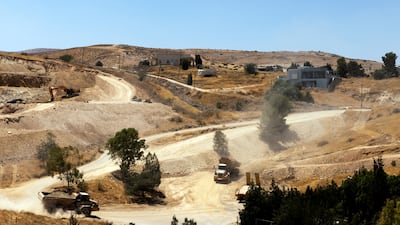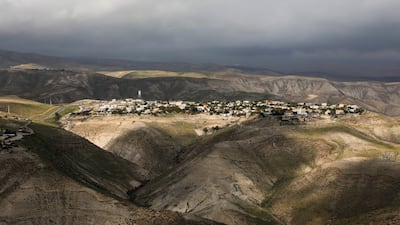Israeli settlement expansion in the occupied West Bank is continuing apace after the collapse of the coalition government in Israel.
Meanwhile, new settlement plans that critics say could jeopardise the viability of a Palestinian state will not be discussed during US President Joe Biden's visit on Wednesday.
Israel’s parliament, the Knesset, voted to dissolve itself last month, spelling the end of the ruling coalition and triggering elections that will happen in November.
The continuing settlement construction — including plans to develop 4,400 new homes in the West Bank — will test the Biden administration’s stated commitment to pursuing a two-state solution to the Israel-Palestine crisis.
On July 3, 29 Democrat members of the House of Representatives urged Mr Biden to push back against Israeli settlement plans in an area called E1, or East 1. This comprises an existing Israeli settlement but also an area of land that would create a continuous arc of Israeli construction in the West Bank, to the north east of East Jerusalem.
In a letter to US Secretary of State Antony Blinken, the Democrat politicians called the plans for E1 a “red line” and said it would severely damage a potential two-state solution by bisecting the West Bank.
Crisis in the Knesset
In June 2021, eight parties — a diverse grouping that included the United Arab List, also known as Raam, the first Israeli Arab party to join an Israeli government — formed to unseat former prime minister Benjamin Netanyahu.
The coalition, led by former prime minister Naftali Bennett — who handed over his role to former coalition partner Yair Lapid last week, part of a deal struck when the coalition formed — was initially under pressure from the Biden administration on settlement construction.
"We are deeply concerned about the Israeli government's plan to advance thousands of settlement units…many of them deep in the West Bank," State Department spokesman Ned Price warned Mr Bennett’s government in October last year.
Mr Bennett came under political attack from right-wing Israelis, who accused him of limiting approvals for settlement construction. However, in April his government advanced plans to build 4,000 new settler homes in the West Bank.
The US State Department warned it would “strongly oppose the expansion of settlements which exacerbates tensions and undermines trust between the parties.". However, Reuters reported on Monday that expansion has continued apace.
In May, the Israeli government approved 4,400 new homes for Jewish settlers. Plans for a further expansion of settlements, that will effectively cut through the area Palestinians hope will form the basis of a future state, are set to be discussed after Mr Biden's visit to the region.
Israel strongly rejects accusations from international and local rights groups that the settlement enterprise has created a system of apartheid — one of the main claims by those opposed to Israeli construction in the West Bank.
Data collected by Israeli authorities shows a trend of expanding Israeli presence.
In the area of the West Bank where Israel has full control and where most Jewish settlements are located — a zone referred to as Area C under the Oslo Peace accords agreed in the 1990s — only 33 building permits for Palestinians have been approved in the last five years, Israeli Deputy Defence Minister Alon Schuster told the Knesset in February.
During that time, more than 9,600 housing units were started for Israeli settlers in the West Bank, according to Israel's Central Bureau of Statistics.











